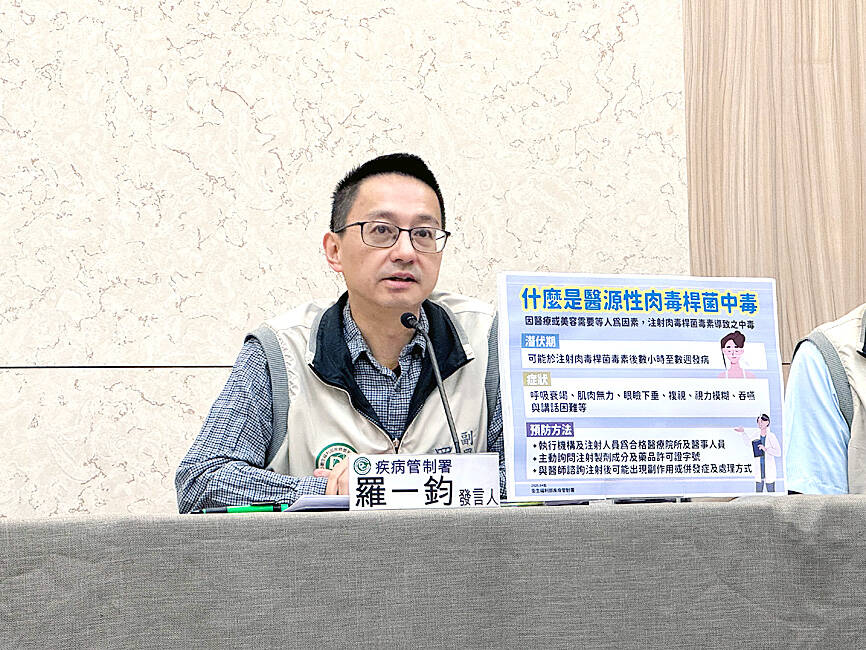A woman in her 40s was hospitalized with severe botulism after receiving injections that she purchased online, the Centers for Disease Control (CDC) said yesterday.
CDC physician Lin Yung-ching (林詠青) said the seller allegedly traveled to the woman’s home late last month to administer injections in her forehead and cheeks for cosmetic purposes.
Three days after the injections, the woman developed symptoms including difficulty swallowing, disrupted salivary secretion, drooping eyelids, muscle weakness and general fatigue, Lin said, adding that she sought medical treatment the next day and was hospitalized.

Photo: CNA
On the sixth day after the onset of symptoms, the woman was transferred to an intensive care unit and put on a ventilator as she had difficulty breathing, he said.
Blood serum and stool tests were negative for botulinum toxin, but that might have been because the specimens were collected more than a week after the woman received the injections, he said.
However, that her symptoms matched those of botulism and the injections before their onset justify the diagnosis, Lin added.
The woman’s condition had improved and she had been transferred to a normal ward, he said.
The local health department is investigating the seller and the source of the products, as well as whether they were illegally sold and how the injections were administered, the CDC said.
CDC Deputy Director-General Philip Lo (羅一鈞) said that such injections for cosmetic and medical purposes contain low doses of botulinum toxin, so the risk of botulism is minimal.
However, the risk is greater if the source of the product is unknown, Lo added.
Since 2019, there have been eight reported cases of botulism associated with aesthetic medicine in Taiwan, but the latest case is the only one of severe botulism, he said, adding that the woman’s condition improved after she was treated with a botulism antitoxin, a product that costs NT$226,480 per vial and must be purchased privately.
People seeking Botox treatments should research the procedure, only get injections at registered healthcare facilities and have them administered by registered healthcare practitioners, make sure the physician informs them about possible side effects and complications, as well as response measures, and check the drug permit license on product, the CDC said.
Meanwhile, CDC Epidemic Intelligence Center Director Guo Hung-wei (郭宏偉) said that four new cases of measles — two local and two imported — were reported last week.
The local cases are two boys under one year old who both had links to a previously reported imported case from Vietnam, while the two imported cases are a one-year-old boy and a woman in her 30s who visited Vietnam during their incubation periods, Guo said.
The two local cases had visited the same clinic as a previously confirmed case and they developed symptoms 10 and 11 days after their visits, Lin said.
The incubation period of measles can be as long as 18 days, so people who are identified as close contacts of confirmed cases should avoid public venues or wear a mask, and if they develop suspected symptoms, they should avoid seeking medical attention on their own and contact the local health department to arrange treatment, the CDC said.
People should not take young children who are not fully vaccinated against measles to Vietnam at this time, while others who are visiting Vietnam should take precautionary measures to prevent infection, it said.

Taiwan is stepping up plans to create self-sufficient supply chains for combat drones and increase foreign orders from the US to counter China’s numerical superiority, a defense official said on Saturday. Commenting on condition of anonymity, the official said the nation’s armed forces are in agreement with US Admiral Samuel Paparo’s assessment that Taiwan’s military must be prepared to turn the nation’s waters into a “hellscape” for the Chinese People’s Liberation Army (PLA). Paparo, the commander of the US Indo-Pacific Command, reiterated the concept during a Congressional hearing in Washington on Wednesday. He first coined the term in a security conference last

A magnitude 4.3 earthquake struck eastern Taiwan's Hualien County at 8:31am today, according to the Central Weather Administration (CWA). The epicenter of the temblor was located in Hualien County, about 70.3 kilometers south southwest of Hualien County Hall, at a depth of 23.2km, according to the administration. There were no immediate reports of damage resulting from the quake. The earthquake's intensity, which gauges the actual effect of a temblor, was highest in Taitung County, where it measured 3 on Taiwan's 7-tier intensity scale. The quake also measured an intensity of 2 in Hualien and Nantou counties, the CWA said.

The Overseas Community Affairs Council (OCAC) yesterday announced a fundraising campaign to support survivors of the magnitude 7.7 earthquake that struck Myanmar on March 28, with two prayer events scheduled in Taipei and Taichung later this week. “While initial rescue operations have concluded [in Myanmar], many survivors are now facing increasingly difficult living conditions,” OCAC Minister Hsu Chia-ching (徐佳青) told a news conference in Taipei. The fundraising campaign, which runs through May 31, is focused on supporting the reconstruction of damaged overseas compatriot schools, assisting students from Myanmar in Taiwan, and providing essential items, such as drinking water, food and medical supplies,

New Party Deputy Secretary-General You Chih-pin (游智彬) this morning went to the National Immigration Agency (NIA) to “turn himself in” after being notified that he had failed to provide proof of having renounced his Chinese household registration. He was one of more than 10,000 naturalized Taiwanese citizens from China who were informed by the NIA that their Taiwanese citizenship might be revoked if they fail to provide the proof in three months, people familiar with the matter said. You said he has proof that he had renounced his Chinese household registration and demanded the NIA provide proof that he still had Chinese